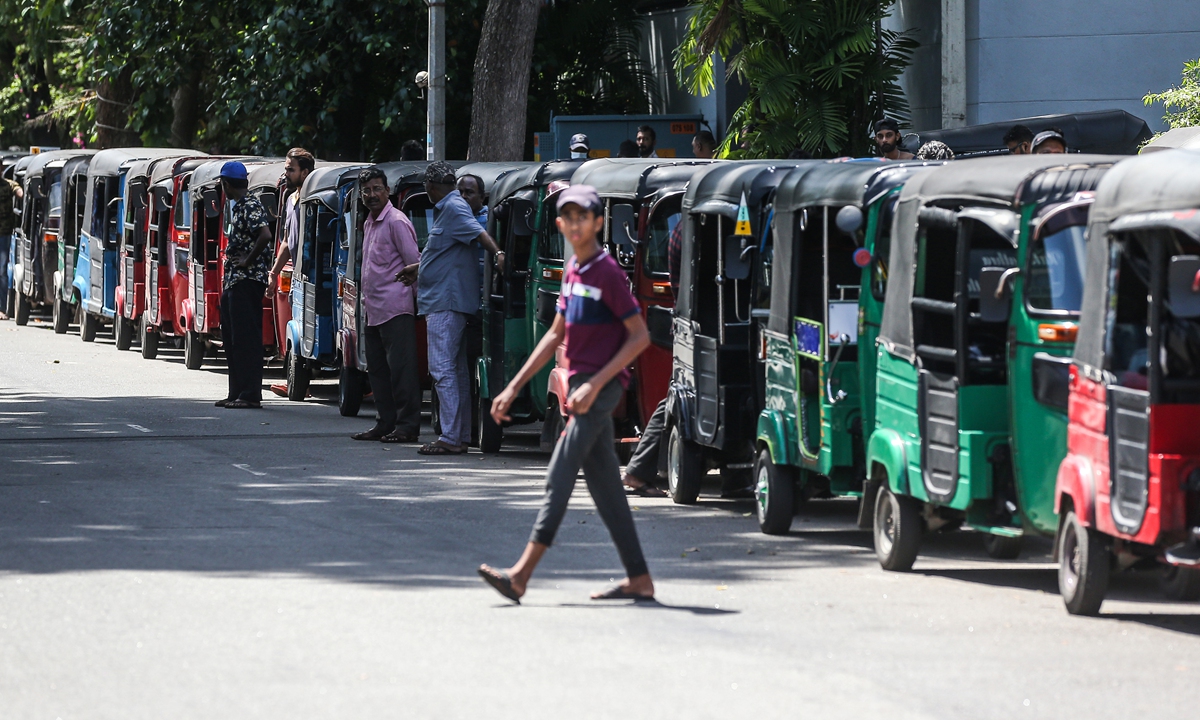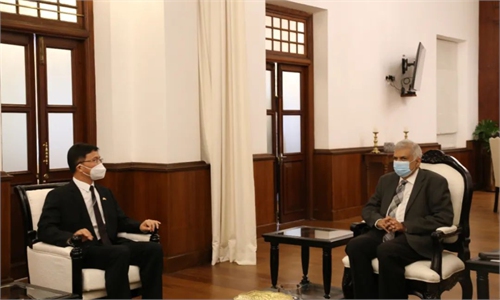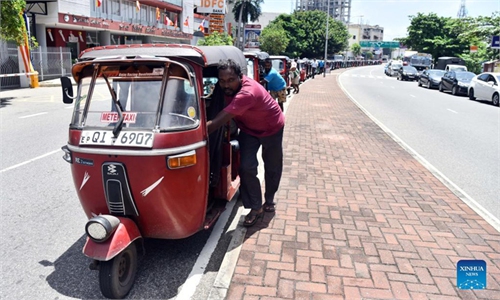US monetary policy deepens global debt crisis in developing economies, including Sri Lanka
China’s BRI ‘debt-trap diplomacy’ toward Sri Lanka rebutted

Motor tricyle drivers wait in a long line to buy gasoline at a gas station due to the fuel shortage in Colombo, Sri Lanka on May 21, 2022. Photo: VCG
Sri Lanka is grappling with the deepest economic crisis it has ever seen. The country has defaulted on its $78 billion worth of payments to international creditors, the first time in its history since its independence. Its debt obligations for this year alone exceed $7 billion, yet Sri Lanka's foreign reserves stood at $1.93 billion at the end of March. The island nation is also seeing an extreme scarcity of food, fuel and other essential items such as medicines, sharp price rises and crippling power cuts.
The current crisis was accelerated by deep tax cuts promised by the previous government in addition to economic mismanagement. The tourism industry has also been hit hard by the COVID-19 pandemic, which accounts for a large share of the country's GDP.
Among other factors, tighter US monetary policy is also hampering the economic recovery of the developing world. A stronger US dollar and interest rate hikes of the US Federal Reserve and other central banks are likely to worsen a global debt crisis, especially the developing economies. Meanwhile, Western sanctions against Russia and ongoing Russia-Ukraine tensions have also impacted the global economy and created a new wave of economic turbulence by rising food, fertilizer and energy prices.
It is fair to say that economic sanctions are increasingly being used to promote the full range of American foreign policy goals. Sanctions only make the global economy worse, affecting the people around the world.
Some also hyped that Sri Lanka's debt burden was a result of China-proposed Belt and Road Initiative (BRI) projects like Hambantota Port. Both US and Indian forces vilified China's BRI as "debt-trap diplomacy." However, there is no evidence supporting the claim. According to data from the Sri Lanka Department of External Resources, loans from China accounted for only about 10 percent of Sri Lanka's total foreign debt in 2021, roughly the same as Japan, and much less than market borrowings and multilateral development banks. Furthermost Chinese loans are concessional and taken for infrastructure and eco-social development.
In fact, in partnership with BRI, Sri Lanka commenced a series of developmental projects, leading to a huge overhaul of Sri Lankan infrastructure which had been lagging behind for generations. These include the Colombo-Katunayake Expressway, Southern Expressway, Outer Circular Highway, Hambantota Port, Matala Airport, Lakvijaya Power Plant and Colombo Port City Development Project. Improving infrastructure and creating jobs have immensely benefited the Sri Lankan people.
In particular, since China Merchants Port Holdings Co Ltd began operating the Hambantota Port in 2017, it has witnessed remarkable growth, with cargo volumes at the port are also steadily on the rise. Several manufacturing enterprises are already being set up in the Hambantota Port Industrial Park such as a $58 million yacht building facility, by SeaHorse Yachts, a $15 million plug and play park-in-park facility by Shenzhen Xinji Group, and a $300 million tire manufacturing plant by Shandong Haohua Tire Co.
The port's previous operation failure was mainly because Sri Lanka lacked in areas of market power, marketing skills, technological expertise, international financing and an international cooperation network.
In early May, Sri Lanka's new Prime Minister Ranil Wickremesinghe said that his new government will continue to attach great importance to developing ties with China and will push forward BRI projects in the country. During a meeting with Qi Zhenhong, Chinese Ambassador to Sri Lanka, Wickremesinghe stressed that the new government will push forward the development of Colombo Port City and Hambantota Port projects among other major cooperation projects and make every effort to protect the safety of Chinese institutions and personnel in Sri Lanka.
Sri Lanka, under the new government, will continue to actively participate in the BRI, to further strengthen cooperation with China in infrastructure construction, trade, investment and technology. Further, this government will work with China to complete a free trade agreement, which is expected to open up the vast Chinese market to Sri Lankan products.
Over the past two years, China has extended assistance to Sri Lanka in many forms including 26 million doses of COVID vaccines, frequent shipments of personal protective equipments and medical equipment, as well as creating around 11,000 jobs for Sri Lankans in Chinese projects.
The Chinese government also vowed to provide emergency humanitarian aid to Sri Lanka, which includes rice, drugs and other essential products. As a major shareholder of the IMF, China also agreed to play an active role in encouraging the IMF to positively consider Sri Lanka's difficulties and properly reach an agreement as soon as possible.
The Chinese government and people sympathize with Sri Lanka's current hardship linked to the economy and people's livelihood, and will continue to do its best to help Sri Lanka tide over the current difficulties. China has always been a reliable friend and partner of Sri Lanka. The friendly relationship between China and Sri Lanka benefits the development of both countries and serves the fundamental interest of both peoples.
In terms of geopolitical factors, India has a keen interest in not letting Sri Lanka lean too much toward China. Therefore, New Delhi is leveraging its position in the current unprecedented economic crisis to distance Sri Lanka from China. But India should think about jointly investing in Sri Lanka with China to help ameliorate the current situation.
The failure of South Asian Association for Regional Cooperation to nurture cooperation in South Asia has pushed other South Asian nations to look for alternative investment opportunities like BRI to bridge the investment gap in infrastructure projects to improve connectivity. The BRI projects are bringing tangible benefits to South Asian nations in many areas.
Maya Majueran is currently serving as a director of Belt&Road Initiative Sri Lanka (BRISL), a Sri Lanka-based organization that specializes in BRI cooperation.


